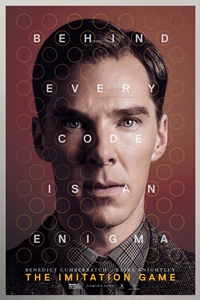 The Imitation Game
The Imitation Game
Starring Benedict Cumberbatch, Keira Knightley, Mark Strong, Matthew Goode, Charles Dance, and Steven Waddington
Directed by Morten Tyldum
Rated PG-13
Run Time: 113 minutes
Genre: Drama/Thriller
Opens December 12th
By Eric Forthun of Cinematic Shadows
The Imitation Game features the remarkable, breakthrough performance that Benedict Cumberbatch's career has needed, and one that could very well win him an Oscar. The film is a staunchly confident, harrowing look at the real-life story of English mathematician and logician Alan Turing and his team's cracking of the German WWII code Enigma, mirrored alongside the tale of Turing's later persecution for being a homosexual. A man as intelligent as Turing is reduced to a shell of his former self after he puts together what is arguably the single most important development in the war, leading to the Allied victory and the downfall of Hitler's German Reich. The historical background of the film, and the logistics behind such a complicated, intricate code-breaking process, do not fly over the heads of individuals unfamiliar with the story, but rather provide further enlightenment into a world without computers or advanced technology. The codes themselves act as a symbol for the way that everyone hide their true selves, marking a world shrouded in secrecy, mystery, and heartbreak.
Alan Turing's life picks up in the late 1920s as he studies at a private school and faces bullies left and right. He's smarter and stranger than everyone else around him, making him an outcast and an easy target. Brutal looks at the bully's punishment include being trapped underneath floor boards and pouring food on him while he sits alone at lunch. He befriends a young man in school and hopelessly falls in love, hiding his feelings behind a veil of heteronormative fear and potential heartbreak. It's no surprise that his past is marked by such tragic, quiet developments, considering his modern-day self is reserved, cold to the touch, but humorously arrogant and mentally strong. Alan (Benedict Cumberbatch) is recruited to interview for a position at Bletchley Park working for the British government's code and cypher station, and he ultimately receives the job alongside other more conventional, less introverted individuals than himself. It makes for a compelling dichotomy as he demands a huge budget for his work and seemingly ignores what needs to happen each day: that the German's Enigma code is put out every 24 hours and that they only have that much time to crack it before it resets. After each day passes, their work is pointless.
It's a frustrating life for the bunch of men, including suave Hugh (Matthew Goode), conversationalist John (Allen Leech), and concerned young man Peter (Matthew Beard). They all do not get along with Alan in the slightest, even when secretary/genius Joan (Keira Knightley) works with Alan and helps him uncover some of the truths needed to crack such a code. The film utilizes three narratives to interweave its story with ease: Alan's teenage experiences, his work during World War II, and the aftermath of being riddled with breaking codes in the early 1950s as his cases are investigated and examined for possible sexual deviances. It's an uncompromising truth of the times when homosexuality was persecuted in Western culture and treated as something equitable to child molestation and perversions; even if such general disdain has disappeared from British and American cultures, it still lingers in other cultures under extreme punishment. Why must a genius like Alan be treated as a second-class citizen when he hasn't truly committed a crime? That shies the story away from the more revealing truths that are examined during the war, particularly as everyone has an ulterior motive and reveals the truth only when necessary.
Director Morten Tyldum makes his English-language debut after his excellent Danish film from 2011, Headhunters. He crafts a story that navigates its subject matter with ease and nuance. That's arguably as attributable to the script and editing as it is to the restrained, observant cinematography and guidance. The score from Alexandre Desplat (one of the best composers in the business, producing brilliant work in every piece of music he crafts) is poetically resonant and lyrically sound; the repetition of musical themes enhances the effectiveness of each scene as it builds onto the next. Perhaps the most important revelation from the film, though, is Cumberbatch's unwaveringly brilliant lead performance. As Turing, he pushes the tragedy underneath his terse, persistent exterior and allows us to examine a man consumed by pain and longing. He wants to be loved by a man but has never been able to tell one such a thing, nor has he been able to escape the clutch of judgment from his other faults. Keira Knightley's supporting performance, as a seeming love interest and strong female presence in a world that asks for weak female social roles, makes for confident work to add to her impressive filmography. The Imitation Game resonates profoundly, particularly in its heart-wrenching conclusion, and it's some of the most assertive, important work I have seen all year.









